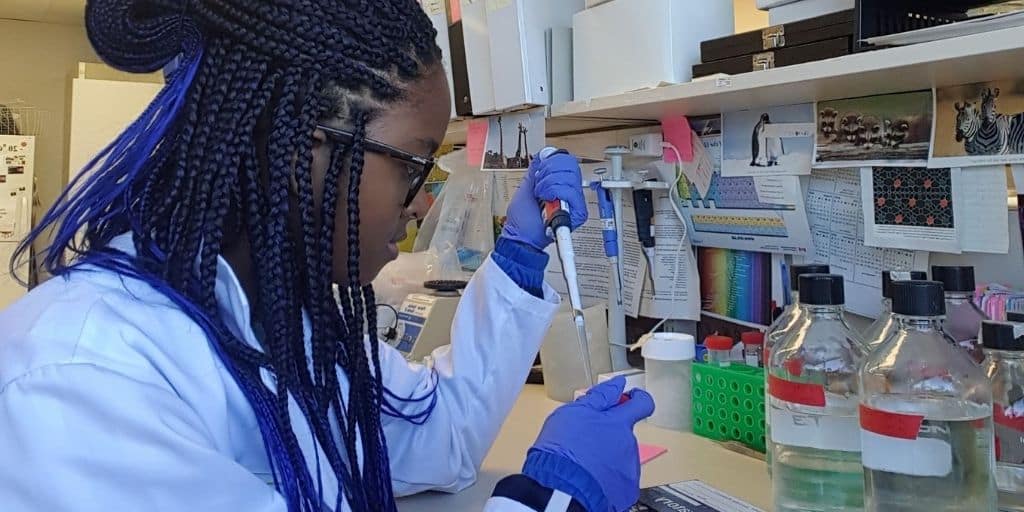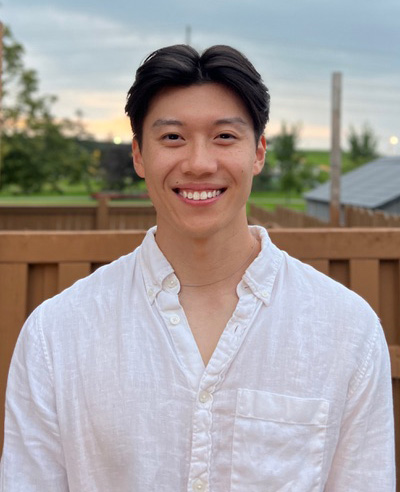1. Who are you? Tell us about yourself.
Hi, my name is Britney Messam. I am an MSc candidate in the Department of Biochemistry, working under the supervision of Dr. Eva Turley. Before starting my MSc, I completed a Bachelor of Medical Sciences degree in Biochemistry and Cell Biology at Western University.
2. Why is the TBCRU Studentship Award important to you?
I am very grateful to have received support from the TBCRU Studentship Award and the Breast Cancer Society of Canada. This award allows me to pursue graduate education and continue contributing to the cancer research community. With this award, I plan to advance our breast cancer knowledge and uncover new therapies that can impact those affected.
3. Tell us about your research. What are you doing, and what problems do you hope to solve?
Triple-negative (TN) breast cancer is an aggressive, invasive and recurring type of breast cancer that often affects young women. We have previously demonstrated that high expression of a molecule called “RHAMM” increases the responsiveness to therapy. In my project, we will be using tumour samples from real breast cancer patients and special 3D models that more closely mimic the body’s tumour environment. Using these models, we will test the theory that RHAMM expression by TN breast cancer cells can predict how the cancer will respond to drug therapies.
4. Why is your research important? How can your research be applied in the real world?
Chemotherapy is currently the primary option for treating TN breast cancer, but this treatment becomes ineffective for many patients. This study will allow us to further understand the role of RHAMM in TN breast cancer and whether it could be used to identify TN breast cancers that are sensitive to particular therapies. Suppose this study confirms that RHAMM can predict sensitivity to treatment in our 3D models. In that case, this research will facilitate future clinical studies assessing RHAMM as a biomarker for TN breast cancer treatment.
5. What inspired your research?
This project will be supervised by Dr. Eva Turley, with Dr. Mina Bissell acting as a collaborator and mentor. Dr. Turley has vast knowledge and experience investigating the role of RHAMM in breast cancer aggressiveness and progression. Dr. Bissell is a pioneer in uncovering the importance of the tumour environment and has successfully replicated tumour microenvironments via 3D cell models. We have already shown that RHAMM may predict the sensitivity of aggressive TN breast cancer cells. It is essential to duplicate our results in a breast cancer model that is more similar to that of a patient so that we can use this method in clinics in the future.
6. Why are you passionate about breast cancer research?
Despite many advances in research and our understanding of breast cancer, it is still one of the most common cancers among women worldwide. I have friends and family who have been affected by cancer, so I understand the toll that cancer can bring to individuals and their families. It is important to me that I use this opportunity to positively contribute to the breast cancer community.
7. Why do you think breast cancer research matters?
With the help of breast cancer research, doctors have been able to provide treatments that extend and improve the lives of those affected by breast cancer. While certain treatments and therapies may work now, new and improved methods are still needed to tackle this disease. Supporting breast cancer research allows researchers to continue to advance our knowledge of this disease, better equip our doctors and improve the lives of breast cancer patients and survivors.
8. What excites you about your work?
Every time I conduct research, I am given the opportunity to discover something that, as a research community, we may not have known before. Being a part of breast cancer research means that the work I do can positively affect real lives.
9. What do you see yourself doing in the future?
With any activity that I do, my main focus is on how I can help others. I see myself continuing to contribute to the research community, whether it be for a health-related company or a research lab. When I am prepared, I also plan to apply to medical school to help people directly.
10. What do you like to do when you aren’t working on research?
When I am not working on research, I like to relax with family and friends, read murder mystery novels and play sports. When the weather is nice, I like to go for walks and sightsee in new environments.




